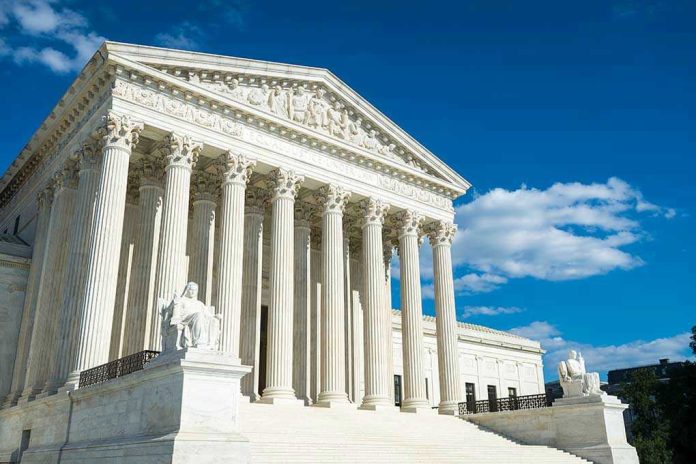
Can regular marijuana users legally own guns? The Supreme Court is about to decide.
Story Overview
- The Supreme Court will hear a pivotal case, *U.S. v. Hemani*, on marijuana use and gun rights.
- The case will address whether federal law barring drug users from owning firearms violates the Second Amendment.
- A circuit split exists, with conflicting lower court decisions on this issue.
- The outcome could significantly impact state-level marijuana programs and gun rights.
Case Background
The U.S. Supreme Court’s decision to hear *U.S. v. Hemani* comes at a crucial intersection of drug policy and gun rights. At the heart of the case is Section 922(g) of federal law, which prohibits individuals who use or are addicted to controlled substances from owning firearms. The defendant, Hemani, has a history of marijuana and cocaine use along with drug sales, making him a controversial figure in this debate.
The Trump administration has staunchly defended this prohibition, arguing that it targets individuals who pose a clear danger of misusing firearms. The Supreme Court’s choice to hear this case, while declining another similar case, suggests a strategic move to address this constitutional question through the lens of a less sympathetic defendant.
Legal and Historical Context
Section 922(g) has long been a point of contention as it categorizes drug users as ineligible for firearm possession. The statute’s language, particularly the emphasis on “habitual users,” has been scrutinized in legal filings. The Supreme Court’s higher standard for gun rights restrictions now requires policies to align with the historical context of the Second Amendment’s original 1791 ratification.
This creates a challenge for the government, as historical analogues include outdated laws that targeted specific groups. Furthermore, the growing tension between state-level marijuana legalization and federal firearm restrictions complicates enforcement, with medical marijuana patients facing tough choices between medication and Second Amendment rights.
Stakeholders and Perspectives
The primary defendant, Hemani, is a dual American and Pakistani citizen with alleged ties to hostile Iranian entities. The Justice Department has emphasized that the firearm restriction is temporary, suggesting individuals can regain their rights by ceasing drug use. Meanwhile, circuit courts have been divided: the Tenth Circuit sided with a defendant in Oklahoma, while the Eleventh Circuit supported medical cannabis patients’ gun rights.
State officials like Kentucky Governor Andy Beshear have advocated for federal reforms to protect medical marijuana patients’ gun rights. Bipartisan state legislators have also pushed for amendments to federal law, though congressional action has yet to materialize.
Implications and Future Outcomes
The Supreme Court’s decision in *U.S. v. Hemani* will set a nationwide precedent on the intersection of drug use and Second Amendment rights. This ruling could affect millions of Americans in states with legal marijuana programs, forcing them to choose between treatment and gun ownership if the prohibition is upheld. Conversely, a ruling against the prohibition could harmonize state and federal policies, allowing marijuana users to possess firearms.
The case will also clarify how the historical test for gun rights applies to modern drug policy. This has broader implications for future challenges to firearm regulations and the consistency of federal law enforcement across jurisdictions. As the case unfolds, both sides will closely watch how the Court’s interpretation of constitutional law evolves in response to these complex issues.



